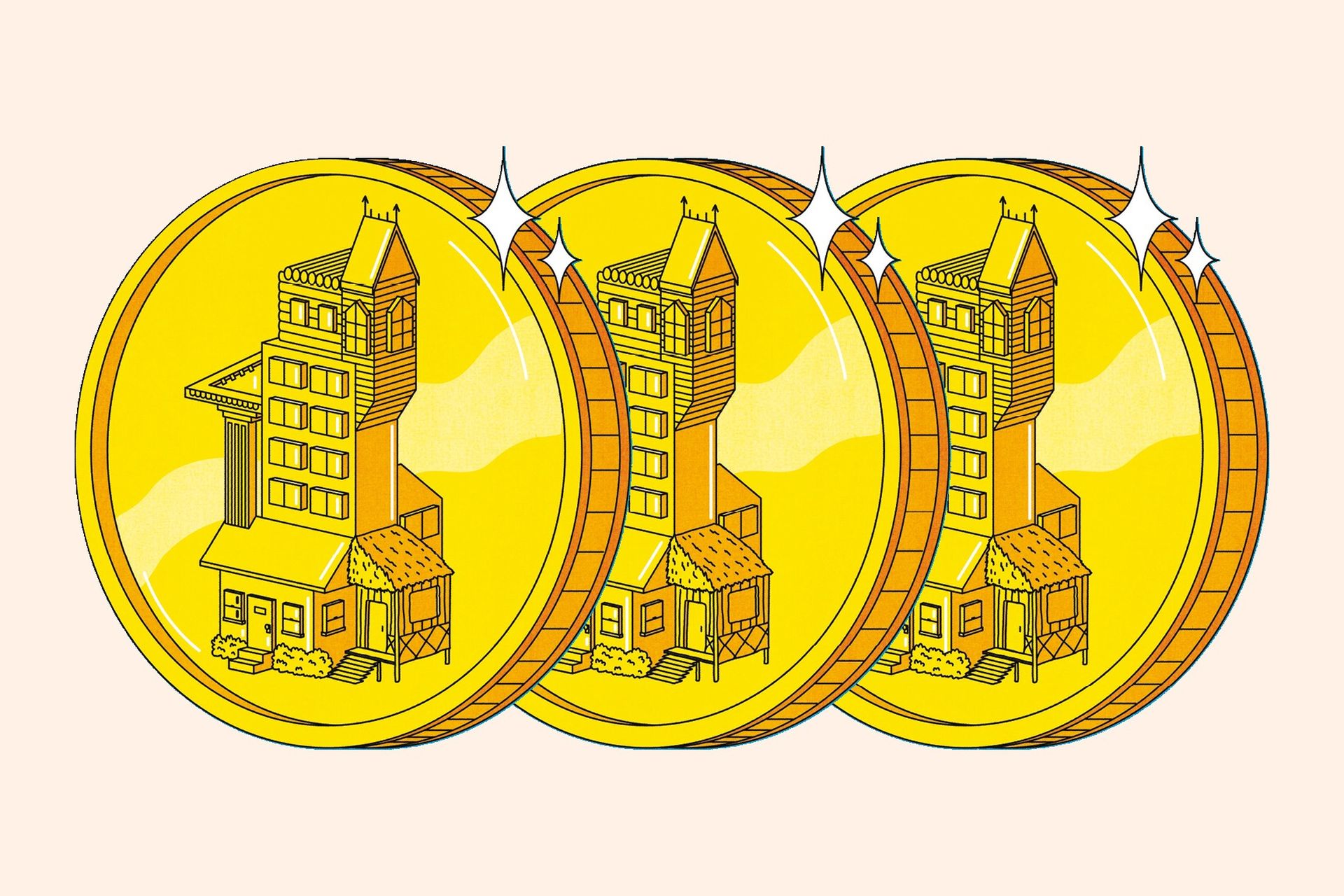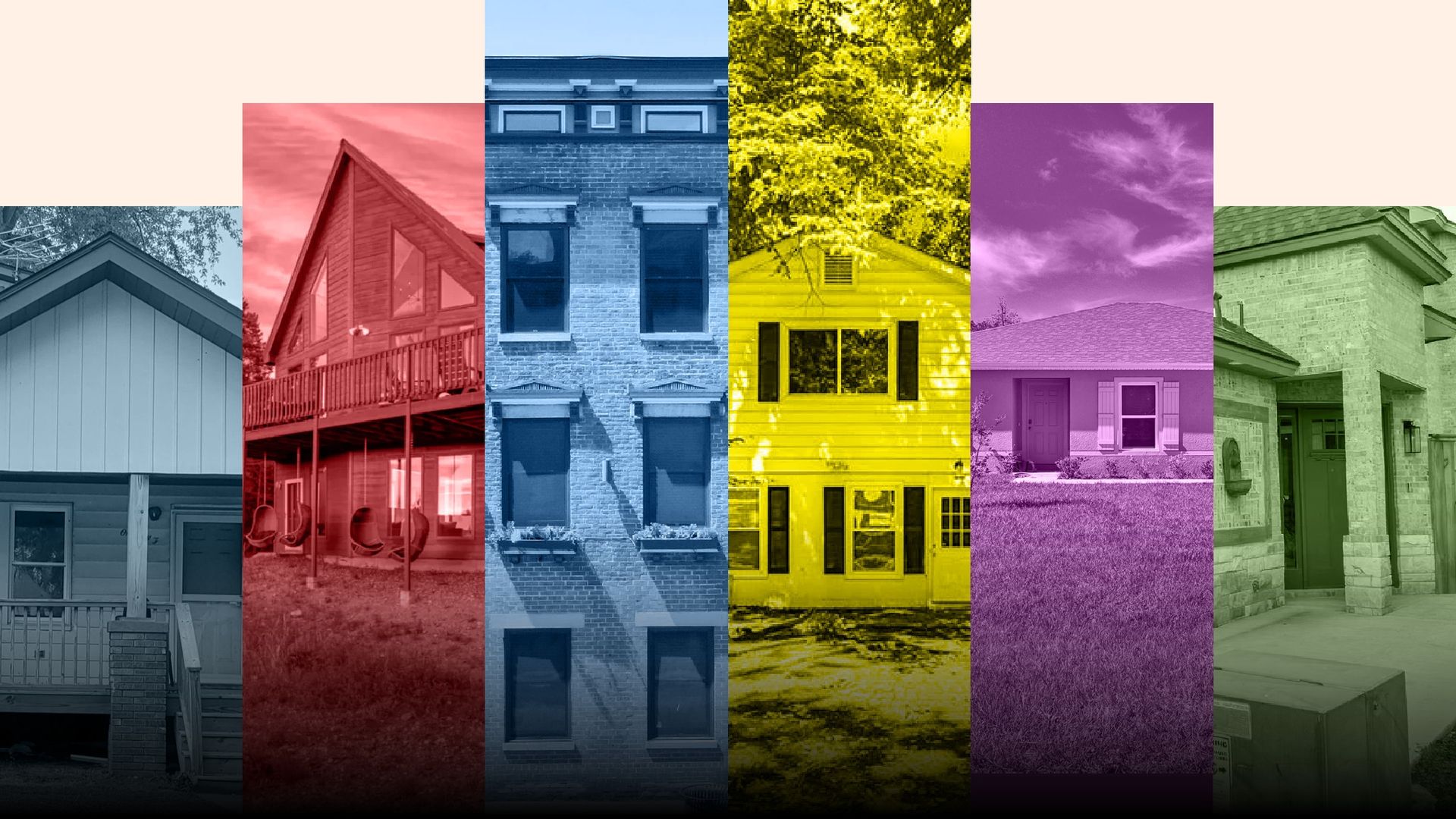尊敬的用戶您好,這是來自FT中文網的溫馨提示:如您對更多FT中文網的內容感興趣,請在蘋果應用商店或谷歌應用市場搜尋「FT中文網」,下載FT中文網的官方應用。

Retired banker Rick Phillips likes investing in property. But instead of putting down a deposit for a place he has seen, or investing money into funds listed on the stock market, the cryptocurrency enthusiast chooses to buy digital tokens that represent ownership of physical properties.
退休銀行家裏克•菲利普斯(Rick Phillips)喜歡投資房地產。但這位加密貨幣愛好者選擇購買代表實物房產所有權的數字代幣,而不是爲他看中的房產支付定金,也不是將資金投資於股市上市的基金。
The Los Angeleno is one of a small number of investors testing the waters in property tokenisation, a nascent way to invest in rental real estate that gives would-be buyers the ability to hold a digital sliver of a bricks-and-mortar building. So far, Phillips has invested $20,000 across several properties.
這位洛杉磯人是少數幾位試水房地產代幣化的投資者之一,這是一種新興的投資方式,讓潛在買家能夠持有一小部分實體建築的數位化份額。到目前爲止,菲利普斯已經在幾個物業上投資了2萬美元。
Property tokenisation companies such as Lofty, RealT and HouseBit offer a range of buildings to invest in, using either cryptocurrency or standard bank deposits.
房地產代幣化公司,如Lofty、RealT和HouseBit,提供了一系列可以使用加密貨幣或標準銀行存款進行投資的建築物。
Born from crypto and blockchain’s promise to democratise finance and broaden financial access, the niche investment method is slowly gaining popularity among crypto fans seeking new areas in which to invest their funds and use blockchain technology — and as high house prices in large cities like London and New York make investing in property outright increasingly unaffordable for many.
這種小衆投資方法源於加密貨幣和區塊鏈對金融民主化和擴大金融准入的承諾,正在逐漸受到加密貨幣愛好者的歡迎,他們在尋找新的投資領域和使用區塊鏈技術的機會。而倫敦和紐約等大城市的高房價使得許多人越來越難以負擔直接投資房地產。
“It’s a different way to invest because it has a lower threshold to getting into buying real property,” says Phillips, who owns “slices” of 12 tenanted properties, mainly in Ohio and Memphis.
「這是一種不同的投資方式,因爲購買房地產的門檻較低,」菲利普斯說道,他擁有12處租賃物業的「份額」,主要位於俄亥俄州和孟菲斯。
The enterprise sounds promising, offering a way to own a slice of a property and benefit from its potential to rise in value and its incoming rents. But there are a host of issues. Not least, investors complain, difficulties selling tokens and problems arising from tenant issues.
這家企業聽起來很有前景,提供了一種擁有部分房產並從其升值潛力和租金收入中受益的方式。但也存在許多問題。投資者抱怨最多的是出售代幣的困難以及由租戶問題引發的麻煩。

Tokenised real estate promises a tangible way to invest small amounts in individual properties, rather than in real estate investment trusts (REITs), which typically own or finance large groups of commercial and residential buildings. “Real estate is a very emotional asset class,” says Jerry Chu, founder of Lofty. “REITs exist and funds exist [but] people seem to be a lot happier about ownership when they can say, ‘It’s this address, I own it because of these reasons.’”
代幣化房地產爲投資者提供了一種以小額資金投資個別房產的有形方式,而不是投資於通常擁有或資助大量商業和住宅建築的房地產投資信託基金(REITs)。Lofty的創辦人Jerry Chu表示:「房地產是一種非常感性的資產類別。REITs和基金都存在,但當人們能夠說『這是這個地址,我擁有它,因爲這些原因』時,他們似乎對所有權更加滿意。」
An asset such as a house or hotel is sliced into digital tokens that represent ownership. Each token can hold information such as the asset’s ownership history, trading and regulatory details, and the tokens live on a blockchain, which essentially acts as a digital record keeper.
像房屋或酒店這樣的資產被分割成代表所有權的數字代幣。每個代幣可以包含資產的所有權歷史、交易和監管細節,這些代幣在區塊鏈上,區塊鏈本質上充當數字記錄器。
Tokenisation is taking off on Wall Street — BlackRock, Franklin Templeton and Fidelity International are among the asset managers exploring tokenising funds in order to make it cheaper and easier to move assets, but these are largely only available to institutional investors, not individuals, and none involve cryptocurrencies; asset managers are still wary.
代幣化正在華爾街興起——貝萊德(BlackRock)、富蘭克林鄧普頓(Franklin Templeton)和富達國際(Fidelity International)等資產管理公司正在探索代幣化基金,以便更便宜、更容易地轉移資產,但這些基金主要只面向機構投資者,而不面向個人,也不涉及加密貨幣;資產管理公司仍持謹慎態度。
$50The typical value of each token representing a fraction of house ownership on Lofty
$50每個代表Lofty房屋所有權一部分的代幣的典型價值
“It’s really the question of convenience because the asset becomes liquid, it becomes tradable 24/7, and a global pool of investors have access to it,” says Max Dilendorf, a New York-based digital assets lawyer, adding that the retail market for tokenised products is “slowly developing”.
「這實際上是一個便利性問題,因爲資產變得流動起來,變得可以全天候交易,並且全球範圍內的投資者都可以訪問它,」紐約數位資產律師馬克斯•迪倫道夫(Max Dilendorf)表示,他補充說,代幣化產品的零售市場正在「緩慢發展」。
Tokenising illiquid assets globally could create a market worth between $2tn and $16tn by 2030, according to estimates from McKinsey and Boston Consulting Group. Tokenised home equity alone could be worth $3.2tn, BCG estimates, and enable “borderless” access, by allowing investors from around the world to hold slices of illiquid assets that are otherwise difficult to own.
根據麥肯錫(McKinsey)和波士頓諮詢公司(Boston Consulting Group)的估計,到2030年,全球非流動性資產代幣化可能創造一個價值介於2兆美元和16兆美元之間的市場。波士頓諮詢公司估計,僅代幣化的房屋淨值就可能價值3.2兆美元,並透過允許來自世界各地的投資者持有難以擁有的非流動性資產的部分份額,實現「無國界」訪問。
“The folks that tend to be interested in tokenised products are individuals that are crypto-forward or interested in the applications of blockchain technology,” says Melissa Bender, a partner at law firm Ropes and Gray. “They’re potentially getting exposure to asset classes that are less accessible to them.”
Ropes and Gray律師事務所的合夥人梅麗莎•本德(Melissa Bender)表示:「對代幣化產品感興趣的人通常是那些對加密貨幣前沿或區塊鏈技術應用感興趣的個人。他們有可能接觸到對他們來說不太容易接觸到的資產類別。」
Mathew, a 42-year-old from Toronto has invested $1,250 in six homes through Lofty, including family homes in Ohio, Chicago and Florida. “I am involved in some other crypto projects . . . [but] cryptocurrency is very volatile so I put my assets into something a little bit more stable,” he says. “I’ve always wanted to own my own place but in the conditions now I can’t do it — getting a downpayment is difficult.” He has made a roughly 10 per cent return over two years.
來自多倫多的42歲的馬修透過Lofty投資了1250美元購買了六套房屋,其中包括俄亥俄州、芝加哥和佛羅里達的家庭住宅。他說:「我還參與了其他一些加密貨幣項目……但是加密貨幣非常波動,所以我把我的資產投入到更穩定的東西上。我一直想擁有自己的房子,但在目前的條件下我做不到——首付款很難籌集。」他在兩年內獲得了大約10%的回報。

Founded in 2018 in Miami, Lofty is backed by Y Combinator, the Silicon Valley start-up incubator that spawned companies including Airbnb and the crypto exchange Coinbase. Property sellers list their buildings on the website and Lofty creates a company registered in Wyoming for each one, making tokens representing the ownership, each valued at $50. The site has tokenised more than 181 properties to date.
Lofty成立於2018年,總部位於邁阿密,得到了矽谷新創孵化器Y Combinator的支援,該孵化器孵化了包括Airbnb和加密貨幣交易所Coinbase在內的公司。房地產賣家在該網站上列出他們的建築物,Lofty爲每個建築物成立了一家在懷俄明註冊的公司,併發行代表所有權的代幣,每個代幣價值50美元。到目前爲止,該網站已經代幣化了超過181處房地產。
Jordan Bentley, who founded an advertising company, owns three rental properties as well as his own home in Utah, properties which he says are worth about $2mn. This summer, he sold 10 per cent of one investment property on Lofty, raising $30,000 to fund buying a new family home. He says selling a slice of the home was cheaper than taking out a loan against a property at high interest rates, and a better decision than selling a property outright to raise cash.
喬丹•本特利(Jordan Bentley)創辦了一家廣告公司,在猶他擁有三處出租物業和自己的住宅,他表示這些物業價值約爲200萬美元。今年夏天,他在Lofty上出售了一處投資物業的10%股份,籌集了3萬美元用於購買新的家庭住宅。他表示,出售部分房產比以高利率抵押貸款更便宜,也比直接出售房產籌集資金更明智。
“The main downside of real estate historically has been the complete lack of liquidity,” says Bentley. It took “a couple of days” to sell the tokens, and the money was paid to him in the form of USDC, the world’s second biggest stablecoin, a form of digital cash that tracks the price of a reserve sovereign currency (in this case, the US dollar). He then transferred it to his own bank account as dollars.
「房地產的主要缺點一直以來都是完全缺乏流動性,」本特利說道。出售代幣花了「幾天」的時間,款項以USDC的形式支付給了他,USDC是世界上第二大穩定幣,是一種跟蹤儲備主權貨幣(在這種情況下是美元)價格的數字現金。然後,他將其轉入自己的銀行賬戶作爲美元。
After investors buy in, each token holder has voting rights in proportion to the number of coins they own, so they can contribute to making decisions about running the property, which are carried out by local property managers, hired by Lofty. “We want to be the Nasdaq of real estate,” says Chu, whose company charges a 3 per cent fee on buy and sell orders for tokens. “Real estate transactions have traditionally been very paperwork heavy . . . we want to update it so it’s a 21st-century process,” he adds.
在投資者買入後,每個代幣持有者都有與其擁有的代幣數量成比例的投票權,因此他們可以參與物業運營的決策,這些決策由Lofty聘請的當地物業經理執行。朱說:「我們希望成爲房地產界的那斯達克(Nasdaq)。」他的公司對代幣的買賣訂單收取3%的費用。他補充道:「傳統的房地產交易文書工作非常繁重……我們希望將其更新爲21世紀的流程。」

Many of Lofty’s first homes were in poorer neighbourhoods and low income housing; investors reported issues with rent arrears, evictions and maintenance problems. The company has recently changed tactics and is encouraging homeowners and Airbnb hosts to list portions of their properties. Rents from the Airbnb visitors are more consistently paid out to investors.
Lofty的許多首次住所位於較貧困的社區和低收入住房;投資者報告稱存在租金拖欠、驅逐和維護問題。該公司最近改變了策略,鼓勵房主和Airbnb的房東將他們的房產部分列出。來自Airbnb訪客的租金更加穩定地支付給投資者。
Available properties include a seven-acre ranch house with space for 40 horses in California; an eight-bedroom wood-beamed cabin in Vermont, rented through Airbnb to skiers; a rustic cabin nestled in the Colorado mountains on an acre of land; and a three-family brick townhouse rented to tenants in upstate New York.
可供選擇的房產包括位於加利福尼亞的一座佔地七英畝、可容納40匹馬的牧場別墅;位於佛蒙特州的一座八居室木樑小屋,透過Airbnb出租給滑雪者;位於科羅拉多山區的一座鄉村小屋,佔地一英畝;以及位於紐約州北部的一座三戶磚砌聯排別墅,出租給租戶。
Phillips, an early investor with Lofty, says he stopped investing in houses in Chicago after rents on his properties there dwindled. “They would have tenant problems and maintenance problems so the cash flows weren’t steady on them.” He adds: “In Chicago, the laws are so renter favourable that when you have a tenant that stops paying rent, it’s very hard to evict them.”
Lofty的早期投資者菲利普斯表示,在芝加哥的房產租金減少後,他停止了在那裏的投資。他說:「他們會遇到租戶問題和維護問題,所以現金流不穩定。」他補充道:「在芝加哥,法律對租戶非常有利,當租戶停止支付租金時,很難將他們驅逐出去。」
Jean-Marc Jacobson, who co-founded RealT in 2019, says that his company is working on creating rental insurance that would pay out to investors if tenants stop handing over rent.
Jean-Marc Jacobson於2019年共同創立了RealT,他表示他的公司正在努力開發一種租賃保險,如果租戶停止支付租金,該保險將向投資者支付賠償金。
Buildings in need of maintenance can also see investors lose out. Each house has a so-called operating reserve on Lofty, essentially a fund worth about 5 per cent of the property’s total value, which is used by the local property managers to spend on maintenance. If the fund loses more than half of its value, investors typically replenish it using their rental income. Rent — when it is collected — is paid into investors’ Lofty wallets in the form of USDC, which they can withdraw to their bank account or crypto wallet.
需要維護的建築物也可能導致投資者損失。每棟房屋在Lofty上都有一個所謂的運營儲備金,基本上是房產總價值的約5%,由當地物業經理用於維護支出。如果該基金損失超過一半的價值,投資者通常會使用他們的租金收入來補充。租金(在收取時)以USDC的形式支付到投資者的Lofty錢包中,他們可以將其提取到他們的銀行賬戶或加密錢包中。
Ownership and trades are recorded on the blockchain, which the companies say makes it easier for bringing in investors from around the world. “On a $100,000 property we have about 600 token holders from about 80 different countries,” says RealT’s Jacobson.
所有權和交易都記錄在區塊鏈上,這些公司表示,這使得吸引來自世界各地的投資者更加容易。RealT的Jean-Marc Jacobson表示:「在一處價值10萬美元的房產上,我們有來自大約80個不同國家的大約600名代幣持有者。」
One significant problem in the nascent market is the lack of secondary buyers. This raises the risk of getting stuck with an investment, or selling at a loss. “I haven’t sold the tokens,” says Jon Steven, who has invested about $28,000 in eight properties. “The secondary market is so thin that it’s hard to get a good price . . . You’ll see a trade for tokens at $30 and then Lofty will still say the tokens are worth $45.”
新興市場中存在一個重要問題,即缺乏二級買家。這增加了投資被困或虧損出售的風險。喬恩•史蒂文(Jon Steven)說:「我還沒有出售這些代幣。」他在八個房產上投資了約28000美元。「二級市場非常薄弱,很難獲得一個好價格……你會看到代幣以30美元的價格交易,然後Lofty仍然會說這些代幣價值45美元。」
“Liquidity is always a concern,” says Bender. “Until there are more participants, you are [still] going to be facing the challenges of holding an illiquid asset.”
「流動性始終是一個問題,」本德說。「在有更多參與者之前,你仍然會面臨持有非流動性資產的挑戰。」

Steven, a 40-year old software engineer, owns and rents out two houses himself in California and Oregon, has about $150,000 worth of crypto investments, $200,000 worth of equities, and “dabbles” in peer-to-peer investing with about $10,000. Investing in tokenised properties allowed him to expand his real estate interests. “I own other properties outright but it’s hard to come up with a lot of money sometimes . . . If I ever find myself with some extra money, rent payments from Lofty, I can reinvest it,” he adds. He has made a return just shy of 6 per cent. (The S&P 500 is up 24 per cent so far this year.)
史蒂文,一位40歲的軟體工程師,在加利福尼亞和俄勒岡擁有並出租兩棟房屋,擁有約15萬美元的加密貨幣投資,價值20萬美元的股票,並且在點對點投資中「涉獵」了約1萬美元。投資代幣化的房產使他能夠擴大自己的房地產興趣。「我擁有其他房產,但有時候籌集大量資金很困難……如果我有多餘的錢,比如來自Lofty的租金,我可以重新投資,」他補充道。他的回報率接近6%。
Reinvestment is often easier than selling individual tokens.
再投資通常比出售單個代幣更容易。
While all tokens on Lofty are created at a value of $50, not all coins, or houses, are equal. Phillips says the ease of selling tokens on Lofty depends on the individual property — and how other investors on the platform assess its potential by reading the financials provided, which can include rental history and Airbnb income, as well as understanding the location and maintenance level of the house.
雖然Lofty平臺上的所有代幣都以50美元的價值成立,但並非所有的代幣或房屋都是相等的。菲利普斯表示,在Lofty上出售代幣的難易程度取決於個別房產,以及平臺上其他投資者透過閱讀提供的財務資訊來評估其潛力,這些資訊可以包括租賃歷史和Airbnb收入,以及瞭解房屋的位置和維護水準。
$3.2tnEstimated potential market size of tokenised home equity by 2030
32億美元預計到2030年,代幣化房屋淨值的潛在市場規模
“Anyone can come and list a property,” says Chu, adding that the company filters out bad actors. “We run background checks on the sellers, we filtered out people with mortgage fraud in the past.”
「任何人都可以來掛牌,」朱說道,並補充說公司會過濾掉不良分子。「我們對賣家進行背景調查,過濾掉過去有抵押貸款欺詐行爲的人。」
Inevitably, being able to invest in properties with crypto raises significant issues such as money laundering and the reliability of customer checks that the tokenisation companies must address — US regulators continue to clamp down on crypto companies and traders acting illegally.
不可避免地,能夠用加密貨幣投資房地產引發了諸如洗錢和客戶檢查可靠性等重大問題,這是代幣化公司必須解決的問題——美國監管機構繼續打擊非法行爲的加密貨幣公司和交易者。
RealT co-founder Jacobson says the average investor holds less than $100,000 on his platform. “If you go over $100,000 then there are further questions, [and requests for] more information about where the money comes from,” he adds.
RealT的聯合創辦人Jean-Marc Jacobson表示,平臺上的普通投資者持有的資金少於10萬美元。他補充道:「如果超過10萬美元,就會有進一步的問題,並需要提供更多關於資金來源的資訊。」
“We are seeing more and more demand from foreigners who want to buy bricks and mortar in the US,” says Benoit Laliberté, chief executive of HouseBit, adding that there is plenty of demand from “people who want to move quickly in the US [market]” and do not want to “go through the problem of banks”, underscoring crypto’s attraction as a tool for money laundering. The anonymity of crypto payments makes them highly attractive for moving money across the world without being detected.
「我們看到越來越多的外國人想要在美國購買房地產,」 HouseBit首席執行長Benoit Laliberté表示,並補充說有很多「想要在美國市場快速行動」的需求,他們不想「經歷銀行的問題」,這突顯了加密貨幣作爲洗錢工具的吸引力。加密支付的匿名性使其在全球範圍內轉移資金而不被察覺非常有吸引力。

Investing in property in this way has a lot of downsides. But positive inspiration for the housing market might come from the hospitality industry, where hoteliers are also eyeing the prospect of selling portions of their buildings as tokens to investors.
以這種方式投資房地產有很多弊端。但房地產市場的積極靈感可能來自酒店業,酒店經營者也在考慮將其建築物的一部分作爲代幣出售給投資者。
In Colorado, the St Regis Aspen Resort sits at the foothills of the mountains and draws thousands of skiers every year. Stephane De Baets, owner of the luxury resort, sold nearly 20 per cent of the hotel through digital tokens to around 1,000 investors in 2018, a move he said was cheaper than raising new finance. He is now looking to link the coins to a real-life use for investors: if an investor wants to book a room, they can redeem their equity whenever they like, in exchange for a 20 per cent reduction on the room rate, based on 2024 rates.
在科羅拉多,聖瑞吉斯阿斯彭度假酒店(St Regis Aspen Resort)坐落在山腳下,每年吸引成千上萬的滑雪者。豪華度假酒店的所有者斯蒂芬•德•貝茨(Stephane De Baets)在2018年透過數字代幣向約1000名投資者出售了酒店近20%的股份,他表示這比籌集新資金更便宜。他現在希望將這些代幣與投資者的實際使用聯繫起來:如果投資者想預訂房間,他們可以隨時兌換股權,以2024年的房價爲基礎,享受房價的20%折扣。

“The owner has a lower cost of capital, and the investor gets a discount on what he would have paid for the room,” he says, adding: “If you’re a family and come skiing every year here, you won’t have a downside unless the room rate crashes, but then, guess what, you and I have bigger problems.”
他說:「業主的資本成本較低,投資者則可以享受房間價格的折扣。」他補充道:「如果你是一個家庭,每年都來這裏滑雪,除非房間價格暴跌,否則你不會有任何損失,但是,猜猜看,你和我會有更大的問題。」
181Number of properties tokenised on Lofty since 2018
181自2018年以來,在Lofty上被標記的房產數量
A life-long Aspen visitor, non-profit consultant Steve Orr invested $100,000 in tokens of the hotel. “It’s an interesting concept and a very effective way to get into the Aspen market, which is crazy,” he says. He looked to buy a place in the town but “the minimum price was $12mn, and that needed $4mn worth of work”.
作爲一位長期的阿斯彭遊客,非營利諮詢師史蒂夫•奧爾(Steve Orr)投資了10萬美元購買酒店的代幣。他說:「這是一個有趣的概念,也是進入阿斯彭市場的一種非常有效的方式,那裏太瘋狂了。」他本來想在鎮上買房,但「最低價格是1200萬美元,還需要價值400萬美元的裝修工程。」
“We’re renting hotel rooms so if we could in perpetuity have a fixed price, that’s pretty attractive stuff,” Orr says.
我們正在租用酒店房間,所以如果我們能夠永久地獲得固定價格,那將是非常有吸引力的,」奧爾說。
Whether property tokenisation takes off or remains a niche way to invest depends partly on whether investors can shake off the taint that comes with holding tokens and trusting their money to the blockchain.
房地產代幣化是會騰飛還是仍然是一種小衆的投資方式,部分取決於投資者能否擺脫持有代幣並將資金託付給區塊鏈所帶來的汙點。
“It still has a stigma,” admits Chu, adding that new investors have plenty of worries. “We constantly get new users who are afraid of blockchain and afraid they’re going to get hacked and lose all their money.”
朱承認:「它仍然帶有汙名。」他補充說,新投資者有很多擔憂。「我們不斷有新用戶害怕區塊鏈,擔心他們會被駭客攻擊,失去所有的錢。」
Orr is more positive: “You’re holding a totally non physical asset [backed by] a physical asset . . . To me the crypto element is window dressing, it’s really just a stock in my mind.”
奧爾更爲積極:「你持有的是一種完全非實物資產,由實物資產支援……對我來說,加密元素只是表面的裝飾,在我看來,它其實只是一隻股票。」
Nikou Asgari is the FT’s digital markets correspondent
尼可•阿斯加里(Nikou Asgari)是英國《金融時報》的數字市場記者。
Find out about our latest stories first — follow @ft_houseandhome on Instagram
第一時間瞭解我們的最新報導——關注 @ft_houseandhome(Instagram)